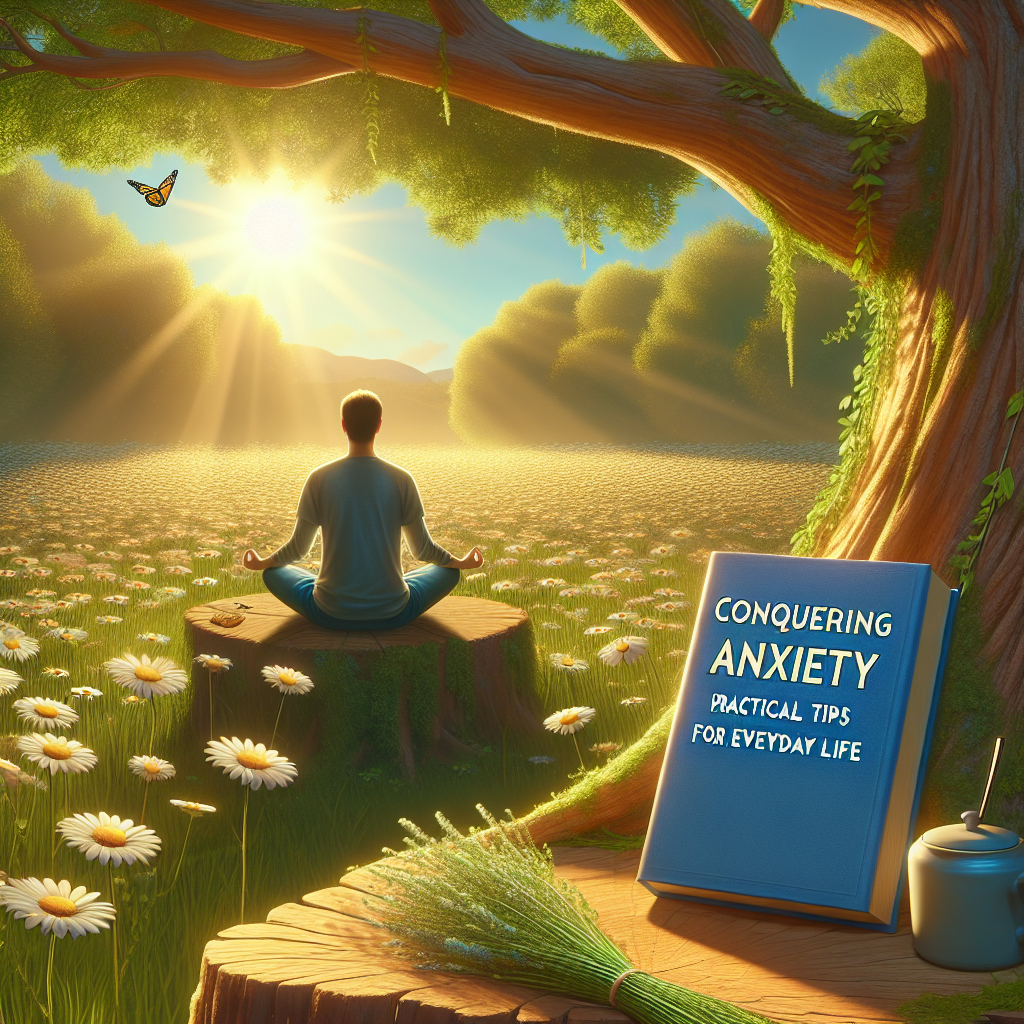
Conquering Anxiety: Practical Tips for Everyday Life
In a world filled with challenges, the struggle against anxiety has become all too common. According to the Anxiety and Depression Association of America, 40 million adults in the U.S. grapple with an anxiety disorder. Whether you’re facing mild worries or overwhelming stress, conquering anxiety is more than a goal—it’s a way to reclaim your life. This ultimate guide, "Conquering Anxiety: Practical Tips for Everyday Life," aims to equip you with invaluable strategies that not only soothe your mind but also empower you to thrive.
Introduction: The Weight of Worry
Imagine waking up feeling refreshed, your mind clear, ready to face the day without the oppressive weight of anxiety. For many, this is just a dream. Anxiety can feel like an uninvited guest that takes up residence in your mind, sabotaging your happiness and undermining your potential. Understanding this, “Conquering Anxiety: Practical Tips for Everyday Life” seeks to provide you with actionable steps and relatable insights designed for manageable integration into your daily routines.
Understanding Anxiety
What Is Anxiety?
Anxiety is not just feeling stressed; it’s a complex emotional response that influences your thought patterns, behaviors, and physical states. From generalized anxiety disorder (GAD) to panic attacks, each type of anxiety presents unique challenges. According to the National Institute of Mental Health, understanding your specific type can be the first step toward conquering anxiety.
The Ripple Effects of Anxiety
The impacts of anxiety extend beyond the individual. From strained relationships to decreased productivity at work, anxiety can create a domino effect that touches every aspect of your life. Thus, embracing strategies for conquering anxiety is invaluable, not just for you but for those around you.
Practical Strategies for Everyday Life
In this section, we will explore practical strategies for conquering anxiety that can be seamlessly integrated into your everyday life.
1. Mindfulness and Meditation
What is Mindfulness?
Mindfulness involves focusing your awareness on the present moment while acknowledging and accepting your feelings and thoughts. According to research published in JAMA Internal Medicine, mindfulness meditation may significantly improve anxiety, depression, and pain.
Practical Tips:
- Start Small: Begin with just five minutes a day. Gradually increase the duration as you grow comfortable.
- Apps for Guidance: Consider using apps like Headspace or Calm to guide your meditation practices.
Case Study: Sarah’s Journey
Sarah, a marketing executive, struggled with chronic anxiety. After incorporating just ten minutes of mindfulness each morning, she reported feeling more grounded and capable of handling stressful situations. This change in her routine illustrates the transformative power of mindfulness in conquering anxiety.
2. Breathing Techniques
The Power of Breath
Breathing techniques can help manage anxiety in real-time. When you focus on your breathing, you are redirecting your mind from stressors.
Practical Tips:
4-7-8 Breathing:
- Inhale for 4 seconds.
- Hold your breath for 7 seconds.
- Exhale for 8 seconds.
- Repeat for four cycles.
- Have a Breathing Buddy: Share this technique with a friend, practicing together can foster a supportive environment.
Case Study: Mark’s Transformation
Mark frequently experienced anxiety attacks during presentations. He integrated breathing techniques into his preparation routine. Not only did this reduce his anxiety, but it also improved his overall performance.
3. Physical Activity
The Connection Between Exercise and Anxiety
Physical activity boosts endorphins and serotonin levels, both of which can enhance mood. According to the Anxiety and Depression Association of America, just 30 minutes of exercise three times a week can reduce anxiety symptoms.
Practical Tips:
- Find Activities You Enjoy: Whether it’s dancing, swimming, or hiking, make it fun.
- Set Realistic Goals: Aim for 10 minutes of movement daily, and gradually increase the duration.
Case Study: Jenna’s New Routine
Jenna, who faced social anxiety, started attending Zumba classes. The combination of movement and social interaction not only decreased her anxiety but also helped her form meaningful friendships.
4. Journaling
Why Write It Out?
Journaling is a powerful cathartic tool that helps clarify thoughts and feelings. According to a study at the University of Texas, expressive writing can significantly reduce anxiety levels.
Practical Tips:
- Daily Prompts: Write about something that worries you and then counter it with things that bring you joy.
- Gratitude Lists: List three things you are grateful for each day to shift focus from concerns to positivity.
Case Study: Daniel’s Reflection
Daniel noticed that journaling his worries before bed helped clear his mind, leading to better sleep and lower anxiety overall. Journaling turned his anxious thoughts into manageable reflections, demonstrating its power in conquering anxiety.
5. Establishing Routines
The Comfort of Structure
Routines create predictability, which can significantly reduce anxiety. Knowing what to expect lessens the unpredictable nature of anxiety.
Practical Tips:
- Morning Ritual: Start your day with a consistent routine, whether it’s enjoying a cup of tea or a short walk.
- Nightly Wind-Down: Create a structure that signals bedtime, reducing anxiety surrounding sleep.
Case Study: Olivia’s Consistency
Olivia, a college student overwhelmed by academic pressures, began setting a structured schedule for her study sessions. This simple practice alleviated her anxiety and improved her focus.
6. Limit Caffeine and Alcohol
The Anxiety-Triggering Duo
Both caffeine and alcohol can exacerbate anxiety symptoms. The Mayo Clinic recommends reducing intake for a calmer mind.
Practical Tips:
- Track Your Intake: Keep a log of how much caffeine or alcohol you consume and how it affects your anxiety levels.
- Try Herbal Teas: Consider herbal teas like chamomile or peppermint as alternatives.
Case Study: Ethan’s Realization
Ethan realized that his evening cup of coffee was impacting his sleep, thereby increasing his anxiety the next day. Once he switched to herbal tea, he noticed measurable improvements in his anxiety levels.
7. Connecting with Others
The Strength of Social Support
Building and maintaining relationships can be fundamental in conquering anxiety. According to research from the University of Michigan, social support significantly reduces anxiety levels.
Practical Tips:
- Join a Support Group: Sharing experiences in a safe environment can diminish feelings of isolation.
- Stay in Touch: Regularly call or text friends and family to maintain connection, even from a distance.
Case Study: Lily’s Support Network
Lily formed a small group of friends who shared similar experiences with anxiety. Their meet-ups not only provided emotional support but also practical coping strategies, demonstrating the power of community in conquering anxiety.
8. Professional Help
The Value of Therapy
If anxiety becomes overwhelming, seeking professional help is essential. Cognitive Behavioral Therapy (CBT) has shown remarkable efficacy in managing anxiety disorders.
Practical Tips:
- Identify Your Needs: Research different therapy types to find what might work best for you.
- Seek Referrals: Ask friends or family for recommendations or search online resources.
Case Study: Alex’s Transformation
Alex’s anxiety had become unmanageable, affecting both work and home life. After seeking help from a therapist specializing in CBT, he was able to develop coping strategies tailored to his life, illustrating the significant benefits of professional intervention.
Conclusion: Your Journey to Conquering Anxiety
Conquering anxiety is not a one-size-fits-all journey. By embracing various practical tips for everyday life—such as mindfulness, physical activity, and establishing routines—you can reclaim control over your mind. Remember that everyone’s path is unique, and it’s okay to seek help along the way.
As you embark on this journey, allow yourself grace and patience; real change takes time. Every small step you take is a victory against anxiety. The journey may be challenging, but the rewards are monumental—serenity, clarity, and a life fully lived.
FAQs: Addressing Your Concerns
1. What is the first step in conquering anxiety?
The first step is acknowledging your feelings and understanding that it’s okay to ask for help. Mindfulness practices can provide a foundation for managing anxiety.
2. Can anxiety be cured?
While anxiety may not be fully "cured," it can be effectively managed through a combination of lifestyle changes, therapy, and in some cases, medication.
3. How do I know if I need professional help?
If anxiety is interfering with your daily life and well-being, it’s advisable to speak with a mental health professional. Signs may include persistent worry, physical symptoms, or avoidance of certain situations.
4. Are there any natural supplements that can help with anxiety?
Some natural supplements, such as omega-3 fatty acids, magnesium, and certain herbal remedies like valerian root, may help alleviate anxiety symptoms. However, consult a healthcare provider before starting any supplement regime.
5. How long does it take to see improvement in anxiety levels?
Improvements vary from person to person. With consistent practice of coping strategies and possibly therapy, many people begin to notice changes within a few weeks.
By implementing these practical tips into your routine, you’ll be well on your way to truly conquering anxiety and navigating life with confidence and peace.















